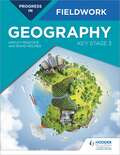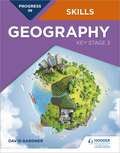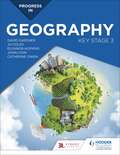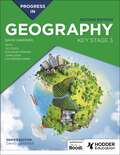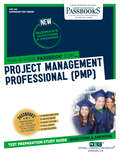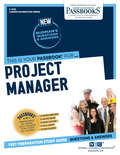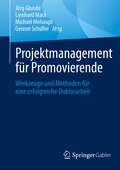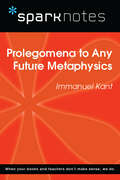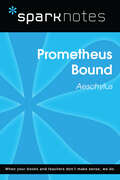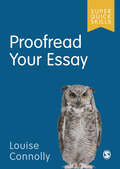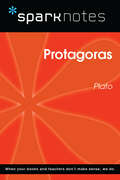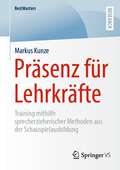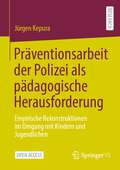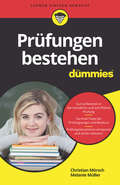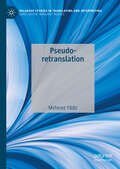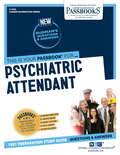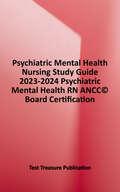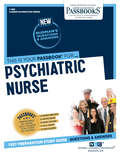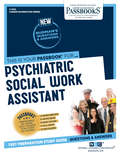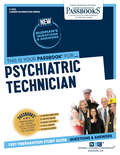- Table View
- List View
Progress in Geography Fieldwork: Key Stage 3
by Hayley PeacockHelp your students understand and conduct fieldwork enquiries in their local area with Progress in Geography Fieldwork: Key Stage 3.Nine ready-made fieldwork enquiries contain the instructions, data and activities your students need to successfully carry out, analyse and evaluate fieldwork in their local area or in the classroom. Save time planning and easily integrate fieldwork into your KS3 curriculum with enquiries such as how safe do people think my local area is for cyclists; how sustainable is my local community; and what are the different microclimates around my school. This book can be used flexibly throughout KS3, to gradually builds towards the skills needed for fieldwork at GCSE.Progress in Geography Fieldwork: Key Stage 3 will allow pupils to:- Experience primary and secondary data collection techniques, from traffic counts to quality of life questionnaires- Learn how to present and analyse data effectively- Develop skills of evaluation to judge the strengths and limitations of various techniques- Complete enquiries even if they are unable to leave school grounds, through the data provided in the book
Progress in Geography Fieldwork: Key Stage 3
by Hayley PeacockHelp your students understand and conduct fieldwork enquiries in their local area with Progress in Geography Fieldwork: Key Stage 3.Nine ready-made fieldwork enquiries contain the instructions, data and activities your students need to successfully carry out, analyse and evaluate fieldwork in their local area or in the classroom. Save time planning and easily integrate fieldwork into your KS3 curriculum with enquiries such as how safe do people think my local area is for cyclists; how sustainable is my local community; and what are the different microclimates around my school. This book can be used flexibly throughout KS3, to gradually builds towards the skills needed for fieldwork at GCSE.Progress in Geography Fieldwork: Key Stage 3 will allow pupils to:- Experience primary and secondary data collection techniques, from traffic counts to quality of life questionnaires- Learn how to present and analyse data effectively- Develop skills of evaluation to judge the strengths and limitations of various techniques- Complete enquiries even if they are unable to leave school grounds, through the data provided in the book
Progress in Geography Skills: Key Stage 3
by David GardnerThis book is designed to help students build up and apply geographical skills throughout KS3. A wide range of skills are introduced in Unit 1, and then revisited and progressed in different contexts in Units 2-15 as part of a learning journey to becoming a geographer. These skills are progressed as an integral component of an enquiry process. The book provides a firm foundation for the geographical skills required at GCSE level and beyond. A wide range of geographical data is provided including satellite images and a large number of OS maps at a variety of scales, often linked to other data, such as ground and aerial photos. Progress in Geography Skills: Key Stage 3 can be used independently or alongside the Progress in Geography: Key Stage 3 Student book.Each page has a specific learning objective and skills focus, such as:- Conducting geographical enquiries; considering different points of view and making decisions - Drawing field sketches, linked to OS maps and locating places using lines of latitude and longitude on an atlas or grid references on OS maps- Understanding and drawing a wide variety of graphs- Analysis and presentation of statistical data- Comparing ground level photographs with Ordnance Survey maps and being able to identify coastal, glacial and river landforms on OS maps- Using newspapers to investigate issues, and detect bias- Using websites, including online GiS, as part of enquiries and investigating data
Progress in Geography Skills: Key Stage 3
by David GardnerHighly Commended in the GA Publishers' Awards 2021:"This comprehensive resource has been designed to work alongside Progress in Geography and uses the same format and recognisable layout. It can also be used as a standalone text and is packed full of resources, well-framed activities, support and practice to help students to develop key geographical skills and think critically about what they're learning. The judges also felt it could be a useful reference for non-specialists and trainee teachers." This book is designed to help students build up and apply geographical skills throughout KS3. A wide range of skills are introduced in Unit 1, and then revisited and progressed in different contexts in Units 2-15 as part of a learning journey to becoming a geographer. These skills are progressed as an integral component of an enquiry process. The book provides a firm foundation for the geographical skills required at GCSE level and beyond. A wide range of geographical data is provided including satellite images and a large number of OS maps at a variety of scales, often linked to other data, such as ground and aerial photos. Progress in Geography Skills: Key Stage 3 can be used independently or alongside the Progress in Geography: Key Stage 3 Student book.Each page has a specific learning objective and skills focus, such as:- Conducting geographical enquiries; considering different points of view and making decisions - Drawing field sketches, linked to OS maps and locating places using lines of latitude and longitude on an atlas or grid references on OS maps- Understanding and drawing a wide variety of graphs- Analysis and presentation of statistical data- Comparing ground level photographs with Ordnance Survey maps and being able to identify coastal, glacial and river landforms on OS maps- Using newspapers to investigate issues, and detect bias- Using websites, including online GiS, as part of enquiries and investigating data
Progress in Geography: Key Stage 3
by David Gardner Catherine Owen Eleanor HopkinsMotivate pupils to develop their geographical skills, knowledge and understanding as they become engaged and accomplished geographers, ready for the demands of GCSE.Specifically designed to provide a solid foundation for the 2016 GCSE specifications, this Student Book takes an enquiry-based approach to learning within each unit and lesson.- Easily and cost-effectively implement a new KS3 scheme of work: this coherent single-book course covers the latest National Curriculum content, providing 150 ready-made lessons that can be used flexibly for a two or three-year KS3- Build and improve the geographical knowledge and skills that pupils need: every double-page spread represents a lesson, with rich geographical data and place contexts for pupils to interpret, analyse andevaluate- Lay firm foundations for GCSE: key vocabulary, command words and concepts are introduced gradually, preparing pupils for the content and question types they will encounter at GCSE, with a particular focus on analysis and evaluation questions- Effectively assess, measure and demonstrate progress: formative assessments throughout each lesson and summative end-of-unit reviews include questions that show whether pupils are 'working towards', 'meeting' or 'exceeding' expectations- Encourage pupils to check and drive their own progress: learning objectives and end-of-unit learning outcomes help pupils reflect on their learning and make connections between key concepts and skills throughout the course
Progress in Geography: Key Stage 3, Second Edition
by David Gardner Catherine Owen Jo Coles John Lyon Eleanor BarkerPut progression at the heart of your curriculum with this hugely popular KS3 course from David Gardner, a leading authority in the Geography community.Fully reviewed and updated - with three new units - this forward-thinking course will fascinate young geographers, incorporating many diverse voices and exploring 'big ideas' such as place, the Earth's systems, the impact of colonialism and the complexities of development.> Choose the most cost-effective course. With 180 ready-made lessons in a single book, Progress in Geography provides a full three-year KS3. The free accompanying Progression Framework maps progress from Year 7 to Year 9, across the National Curriculum and towards the GCSE Assessment Objectives.> Ensure progress in geographical skills, knowledge and understanding. Every lesson and every unit builds upon prior learning and links to future learning, fully embedding geographical enquiry. Each double-page spread represents one lesson, with rich geographical resources, up-to-date data and case studies for pupils to interpret, analyse and evaluate.> Align with Ofsted's expectations. Curriculum expert David Gardner has fully integrated disciplinary, substantive and procedural knowledge, as recommended in Ofsted's 2023 Geography Subject Report and the GA Curriculum Framework.> Assess and demonstrate pupil progress. Ideal for formative assessment, lesson activities create a stepped approach to enquiry learning, guiding pupils through the geographical data as they answer each lesson's enquiry question. End-of-unit review lessons create a reflection point, facilitating medium-term summative assessment and giving a broader view of progress.> Lay firm foundations for GCSE. Key vocabulary, command words and concepts are introduced gradually, preparing pupils for the content and question types they will encounter at GCSE, with a particular focus on analysis and evaluation, plus newly added decision-making activities.
Progress in Geography: Key Stage 3, Second Edition
by David Gardner Catherine Owen Jo Coles John Lyon Eleanor BarkerPut progression at the heart of your curriculum with this hugely popular KS3 course from David Gardner, a leading authority in the Geography community.Fully reviewed and updated - with three new units - this forward-thinking course will fascinate young geographers, incorporating many diverse voices and exploring 'big ideas' such as place, the Earth's systems, the impact of colonialism and the complexities of development.> Choose the most cost-effective course. With 180 ready-made lessons in a single book, Progress in Geography provides a full three-year KS3. The free accompanying Progression Framework maps progress from Year 7 to Year 9, across the National Curriculum and towards the GCSE Assessment Objectives.> Ensure progress in geographical skills, knowledge and understanding. Every lesson and every unit builds upon prior learning and links to future learning, fully embedding geographical enquiry. Each double-page spread represents one lesson, with rich geographical resources, up-to-date data and case studies for pupils to interpret, analyse and evaluate.> Align with Ofsted's expectations. Curriculum expert David Gardner has fully integrated disciplinary, substantive and procedural knowledge, as recommended in Ofsted's 2023 Geography Subject Report and the GA Curriculum Framework.> Assess and demonstrate pupil progress. Ideal for formative assessment, lesson activities create a stepped approach to enquiry learning, guiding pupils through the geographical data as they answer each lesson's enquiry question. End-of-unit review lessons create a reflection point, facilitating medium-term summative assessment and giving a broader view of progress.> Lay firm foundations for GCSE. Key vocabulary, command words and concepts are introduced gradually, preparing pupils for the content and question types they will encounter at GCSE, with a particular focus on analysis and evaluation, plus newly added decision-making activities.
Progress in Geography: Motivate, engage and prepare pupils
by David Gardner Catherine Owen Jo Coles John Lyon Eleanor BarkerMotivate pupils to develop their geographical skills, knowledge and understanding as they become engaged and accomplished geographers, ready for the demands of GCSE.Specifically designed to provide a solid foundation for the 2016 GCSE specifications, this Student Book takes an enquiry-based approach to learning within each unit and lesson.- Easily and cost-effectively implement a new KS3 scheme of work: this coherent single-book course covers the latest National Curriculum content, providing 150 ready-made lessons that can be used flexibly for a two or three-year KS3- Build and improve the geographical knowledge and skills that pupils need: every double-page spread represents a lesson, with rich geographical data and place contexts for pupils to interpret, analyse andevaluate- Lay firm foundations for GCSE: key vocabulary, command words and concepts are introduced gradually, preparing pupils for the content and question types they will encounter at GCSE, with a particular focus on analysis and evaluation questions- Effectively assess, measure and demonstrate progress: formative assessments throughout each lesson and summative end-of-unit reviews include questions that show whether pupils are 'working towards', 'meeting' or 'exceeding' expectations- Encourage pupils to check and drive their own progress: learning objectives and end-of-unit learning outcomes help pupils reflect on their learning and make connections between key concepts and skills throughout the course
Project Management Professional®: Passbooks Study Guide (Admission Test Series)
by National Learning CorporationThe Admission Test Series prepares students for entrance examinations into college, graduate and professional school as well as candidates for professional certification and licensure. The Project Management Professional® (PMP) Passbook® prepares you by sharpening the skills and abilities necessary to succeed on your upcoming entrance exam. It provides hundreds of questions and answers in the areas that will likely be covered on your upcoming exam.
Project Manager: Passbooks Study Guide (Career Examination Series #C-1433)
by National Learning CorporationThe Project Manager Passbook® prepares you for your test by allowing you to take practice exams in the subjects you need to study. It provides hundreds of questions and answers in the areas that will likely be covered on your upcoming exam, including but not limited to: project management; administration; supervision; preparing written material; and more.
Projektmanagement für Promovierende: Werkzeuge und Methoden für eine erfolgreiche Doktorarbeit
by Jörg Glunde Lienhard Mack Michael Mohaupt Gereon SchüllerProjektmanagement hilft nicht nur beim Schreiben der Dissertation, sondern in der gesamten Promotionsphase dabei, sich selbst und sein Umfeld, insbesondere die Rahmenbedingungen der eigenen Doktorarbeit, besser zu verstehen und zu organisieren. Das Buch wendet bewährte Techniken und Erfahrungen aus dem Projektmanagement auf das Projekt „Doktorarbeit“ an und gibt so praktische Hilfestellungen für die Promotion. Da solche übergeordneten Fähigkeiten in der Promotion, aber auch in anderen Forschungsprojekten und späteren Tätigkeitsfeldern von Promovierten überaus hilfreich sind, haben Mitglieder des PMI Germany Chapter e.V. in Kooperation mit Mitgliedern des Promotionsnetzwerks THESIS e.V. diesen Ratgeber entwickelt, der Promovierenden die wichtigsten Schritte näherbringt, um Methoden des Projektmanagements zur Selbstorganisation bei der Promotion einzusetzen.Der InhaltDie Doktorarbeit als Projekt auffassenDie Promotion planenThema finden, Exposé erstellen und Finanzierung planenMit Risiken umgehenDisputation und ggf. Rigorosum vorbereiten
Prolegomena to Any Future Metaphysics (SparkNotes Philosophy Guide)
by SparkNotesProlegomena to Any Future Metaphysics (SparkNotes Philosophy Guide) Making the reading experience fun! SparkNotes Philosophy Guides are one-stop guides to the great works of philosophy–masterpieces that stand at the foundations of Western thought. Inside each Philosophy Guide you&’ll find insightful overviews of great philosophical works of the Western world.
Prometheus Bound (SparkNotes Literature Guide Series)
by SparkNotesPrometheus Bound (SparkNotes Literature Guide) by Aeschylus Making the reading experience fun! Created by Harvard students for students everywhere, SparkNotes is a new breed of study guide: smarter, better, faster. Geared to what today's students need to know, SparkNotes provides: *Chapter-by-chapter analysis *Explanations of key themes, motifs, and symbols *A review quiz and essay topicsLively and accessible, these guides are perfect for late-night studying and writing papers
Proofread Your Essay (Super Quick Skills)
by ConnollyWant a quick way to boost your grades and confidence? Learn practical techniques and strategies for proofreading your essays that you can apply straight away. This book will help you to: · Quickly identify errors in grammar, spelling and punctuation · Check you are meeting assignment requirements · Write clearly and succinctly · Incorporate criticality into your writing. Super Quick Skills provides the essential building blocks you need to succeed at university - fast. Packed with practical, positive advice on core academic and life skills, you’ll discover focused tips and strategies to use straight away. Whether it’s writing great essays, understanding referencing or managing your wellbeing, find out how to build good habits and progress your skills throughout your studies. Learn core skills quickly Apply them right away and see results Succeed in your studies and in life Super Quick Skills gives you the foundations you need to confidently navigate the ups and downs of university life.
Proofread Your Essay (Super Quick Skills)
by ConnollyWant a quick way to boost your grades and confidence? Learn practical techniques and strategies for proofreading your essays that you can apply straight away. This book will help you to: · Quickly identify errors in grammar, spelling and punctuation · Check you are meeting assignment requirements · Write clearly and succinctly · Incorporate criticality into your writing. Super Quick Skills provides the essential building blocks you need to succeed at university - fast. Packed with practical, positive advice on core academic and life skills, you’ll discover focused tips and strategies to use straight away. Whether it’s writing great essays, understanding referencing or managing your wellbeing, find out how to build good habits and progress your skills throughout your studies. Learn core skills quickly Apply them right away and see results Succeed in your studies and in life Super Quick Skills gives you the foundations you need to confidently navigate the ups and downs of university life.
Protagoras (SparkNotes Philosophy Guide)
by SparkNotesProtagoras (SparkNotes Philosophy Guide) Making the reading experience fun! SparkNotes Philosophy Guides are one-stop guides to the great works of philosophy–masterpieces that stand at the foundations of Western thought. Inside each Philosophy Guide you&’ll find insightful overviews of great philosophical works of the Western world.
Präsenz für Lehrkräfte: Training mithilfe sprecherzieherischer Methoden aus der Schauspielausbildung (BestMasters)
by Markus KunzePräsenz im Sinne von sicherem und bewusstem Auftreten wird in der Schulpraxis als Anforderung an Lehrkräfte formuliert. Klar umrissene sprechwissenschaftliche Definitionen für Präsenz insb. für Lehrkräfte bestanden bisher jedoch nicht. Das vorliegende Buch widmet sich der Bestimmung eines sprechwissenschaftlichen Präsenzbegriffes (insb. Präsenz für Lehrkräfte). Vorgestellt werden Ergebnisse aus Untersuchungen zu Präsenzbegriffen in der Theater-, Sprechwissenschaft und Pädagogik, die eine Bestimmung von Präsenz für Lehrkräfte als spezifische kommunikative Fähigkeit einer Lehrkraft zulassen und auf deren Trainierbarkeit anhand benennbarer Präsenzfaktoren und -potenziale verweisen. Der Anwendungsteil liefert Prinzipien und Elemente sprecherzieherischer Methoden aus der Schauspielausbildung, mit denen eine Schulung von Präsenz für Lehrkräfte nachweislich möglich ist, und enthält ein Übungsprogramm.
Präventionsarbeit der Polizei als pädagogische Herausforderung: Empirische Rekonstruktionen im Umgang mit Kindern und Jugendlichen
by Jürgen KepuraMit diesem Open-Access-Buch wird ein Beitrag zur Professionalisierung der Präventionsarbeit der Polizei geleistet. Polizeibeamtinnen und Polizeibeamten müssen in der täglichen Präventionspraxis unterschiedlichsten Erwartungen gleichzeitig gerecht werden. Die Akteurinnen und Akteure bewegen sich in einem Spannungsfeld, das sich zwischen einer instruierenden Normverdeutlichung und einer entwicklungsorientierten Normvermittlung entfaltet. Der Autor arbeitet den pädagogischen Charakter und die hybriden Anforderungen des Handelns heraus. In der Präventionsarbeit müssen gleichzeitig wirkmächtige polizeiliche und pädagogische Perspektiven balanciert werden. Grundlage für diese Erkenntnisse sind Gruppendiskussionen, die mit Polizistinnen und Polizisten geführt und mit der Dokumentarischen Methode ausgewertet wurden. Das empirische Ergebnis mündet in Konturen einer Professionalitätstheorie für die polizeiliche Präventionsarbeit mit Kindern und Jugendlichen. Die Studie gibt Impulse für die erziehungswissenschaftliche Professionalitätsforschung und die Entwicklung einer aufgabenspezifischen polizeilichen Handlungstheorie.
Prüfungen bestehen für Dummies (Für Dummies)
by Melanie Müller Christian MörschWann ist Ihre nächste Prüfung? Dieses Buch ist ein Mutmachbuch für alle Prüflinge. Melanie Müller und Christian Mörsch zeigen Ihnen, wie Sie sich optimal auf mündliche und schriftliche Prüfungen vorbereiten und motiviert und konzentriert arbeiten. Sie lernen, wie Ihr Gehirn »tickt« und den Prüfungsstoff am besten behält. Sie bekommen Survival-Strategien an die Hand, mit denen Sie Prüfungssituationen sicher meistern und Prüfungsangst oder einem Blackout Paroli bieten. Last-Minute-Tipps für die letzten Stunden vor der Prüfung runden das Buch ab.
Pseudo-retranslation (Palgrave Studies in Translating and Interpreting)
by Mehmet YildizThis book presents pseudo-retranslations as a new phenomenon of translational intertextuality, revealing how pseudo-retranslations establish large networks of intertextuality across academic works, how academic authors have recourse to this procedure as they create their academic texts, and how pseudo-retranslations contribute to the dissemination of translation-distorted scholarly knowledge and lead to epistemically polluted academic ecosystems. Pseudo-retranslation can be defined as an academic author’s partial or complete exploitation of another academic author’s translation and presenting it as a retranslation of the source text. This phenomenon, first documented in Yildiz (2021), arises from academic authors’ failure to refer to or translate primary sources – particularly in English. Since there occurs no actual retranslation process, this procedure is called pseudo-retranslation. Using a range of academic texts from the Turkish context as case studies, the author presents the integral constituents of this phenomenon, and the behavioural patterns of its renderers. This book will be of particular interest to academics and postgraduates in the field of translation studies and (corpus) linguistics.
Psychiatric Attendant: Passbooks Study Guide (Career Examination Series)
by National Learning CorporationThe Psychiatric Attendant Passbook® prepares you for your test by allowing you to take practice exams in the subjects you need to study. It provides hundreds of questions and answers in the areas that will likely be covered on your upcoming exam, including but not limited to; Understanding and care of patients in mental hygiene institutions; Record keeping; Understanding and interpreting written material; and more.
Psychiatric Mental Health Nursing Study Guide 2023-2024 Psychiatric Mental Health RN ANCC© Board Certification
by Test Treasure PublicationUnlock Your Potential and Conquer the Psychiatric Mental Health Nursing Exam with the Ultimate Study Guide! Are you an aspiring psychiatric-mental health nurse determined to ace the ANCC-PMHN Exam? Looking for an all-inclusive study guide that offers more than just textbook information? Your search ends here! Introducing the "Psychiatric-Mental Health Nursing Study Guide 2023-2024", brought to you by Test Treasure Publication—the gold standard in exam preparation resources. Why Choose This Guide? We understand that preparing for the ANCC-PMHN Exam can be overwhelming, which is why we’ve crafted a comprehensive guide that not only covers the essential information but also provides practical tools for effective learning. <p><p>Inside This Guide, You'll Find: <p><p>1. Brief Overview of the Exam and Its Importance: Understand the exam pattern, administered by the American Nurses Credentialing Center, including the number of questions, scoring methodology, and its significance in the nursing profession. <p><p>2. Detailed Content Review: Dive deep into four core study sections—Assessment and Diagnosis, Planning, Implementation, and Evaluation—each replete with individual chapters that break down complex topics into digestible bites. - Assessment and Diagnosis: Developmental Stages, Psychiatric Disorders, and more. - Planning: Cultural Competence, Treatment Planning, and more. - Implementation: Theoretical Frameworks, Medication Management, and more. - Evaluation: Legal and Ethical Considerations, Evidence-Based Practice, and more. <p><p>3. Study Schedules and Planning Advice: Tailored study plans to suit your learning style and schedule. <p><p>4. Frequently Asked Questions: Clear answers to common queries and misconceptions about the exam. <p><p>5. Test-Taking Strategies & Overcoming Test Anxiety: Effective techniques for smart exam-taking and managing stress. <p><p>6. Additional Resources: A curated list of online platforms and academic materials to supplement your study plan. <p><p>7. Final Words with Motivation: Words of encouragement and inspiration as you gear up for the big day. <p><p>8. Two Full-Length Practice Tests: Each with 100 questions and detailed answer explanations, to gauge your preparedness and sharpen your test-taking skills.
Psychiatric Nurse: Passbooks Study Guide (Career Examination Series)
by National Learning CorporationThe Psychiatric Nurse Passbook® prepares you for your test by allowing you to take practice exams in the subjects you need to study. It provides hundreds of questions and answers in the areas that will likely be covered on your upcoming exam, including but not limited to; Mental health and hygiene; Psychiatric problems and principles; Psychiatric nursing; and more.
Psychiatric Social Work Assistant: Passbooks Study Guide (Career Examination Series)
by National Learning CorporationThe Psychiatric Social Work Assistant Passbook® prepares you for your test by allowing you to take practice exams in the subjects you need to study. It provides hundreds of questions and answers in the areas that will likely be covered on your upcoming exam, including but not limited to; Principles and practices of social casework and counseling including interviewing; and use of community resources; Human behavior; Socioeconomic problems and related programs and services; and more.
Psychiatric Technician: Passbooks Study Guide (Career Examination Series)
by National Learning CorporationThe Psychiatric Technician Passbook® prepares you for your test by allowing you to take practice exams in the subjects you need to study. It provides hundreds of questions and answers in the areas that will likely be covered on your upcoming exam, including but not limited to: analyzing situations and making decisions; communication skills; nursing care methods and techniques; health-care principles and practices; and more.
